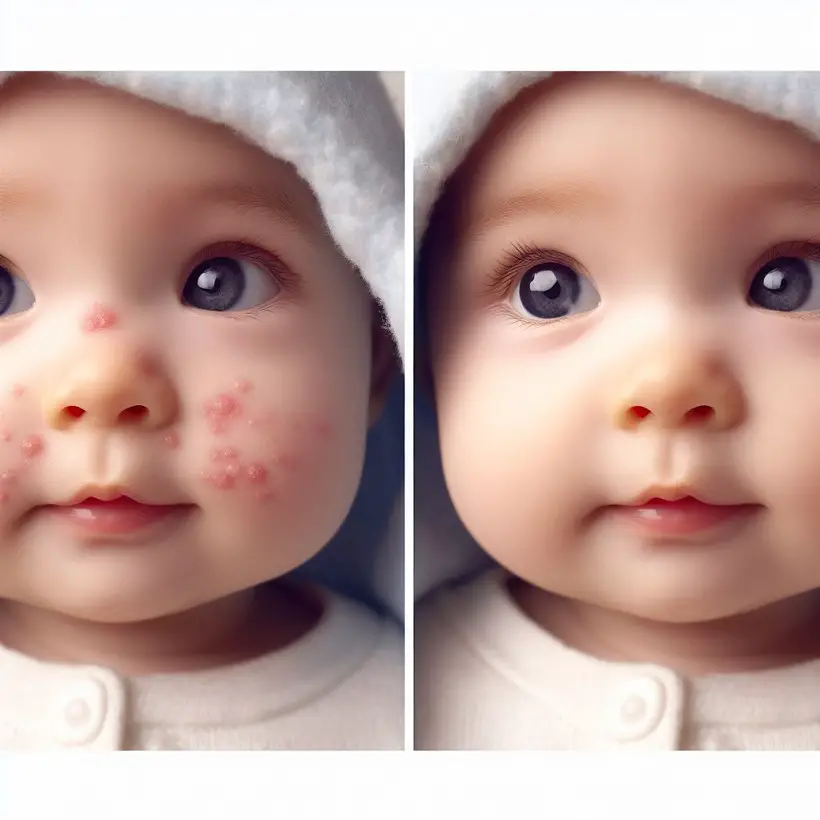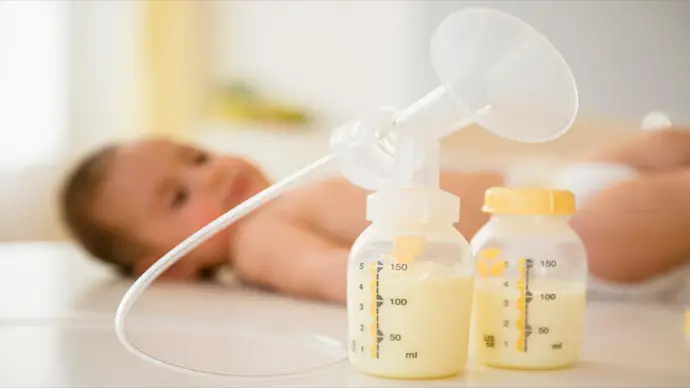As a new parent, you may be understandably concerned if you notice your baby’s lips turning black after feeding. Rest assured, in most cases, this is a harmless and temporary condition. However, it’s essential to understand the possible causes and know when to seek professional advice.
So why do baby lips turn black after feeding? There are several potential reasons for this discoloration, including:
- Pigment changes
- Blood circulation
- Breast milk or formula
- Yeast infection such as oral thrush
In the following sections, we will explore each of these potential causes in more detail and offer tips for addressing black lips in babies.

Key Takeaways:
- Black lips after feeding are a common and usually temporary condition.
- Possible causes include pigment changes, blood circulation, breast milk or formula, and yeast infections.
- Stay tuned for the following sections to learn more about each cause and how to manage black lips in babies.
Why Do Baby Lips Turn Black After Feeding?
If you’ve noticed that your little one’s lips are turning black after feeding, it’s natural to be concerned. While it may look alarming, the good news is that it’s usually nothing to worry about. Lip discoloration is a common occurrence in babies and can be caused by a range of factors.
One possible cause of black lips in babies is simply due to a change in blood flow. When a baby feeds, blood rushes to the mouth and can cause the lips to temporarily darken. This is a normal phenomenon and nothing to be concerned about.
However, black lips can also be a sign of an underlying medical condition. For example, if your baby is having trouble breathing during feeding, they may not be getting enough oxygen which can lead to a bluish or blackish tint in their lips.
Another possible cause of black lips in babies is related to certain foods and beverages. For example, if a baby consumes large amounts of blueberries, blackberries, or grape juice, it can cause temporary discoloration of the lips. This is nothing to worry about and the discoloration will disappear once the food or beverage has passed through the baby’s system.
In rare cases, black lips in babies can be a sign of a more serious medical condition such as a heart defect or a blood disorder. If you notice that your baby’s lips are consistently black or if they are having difficulty breathing or feeding, it’s important to seek medical attention immediately.
Overall, while black lips in babies can be concerning, it’s usually nothing to worry about. In the vast majority of cases, it’s simply a temporary discoloration caused by a change in blood flow or certain foods and drinks. Keep a close eye on your little one’s lips and if you have any concerns, don’t hesitate to speak to your healthcare provider.
Breastfed Babies and Black Lips
If you are a breastfeeding mother, you may wonder if your milk can cause your baby’s lips to turn black. However, breast milk does not typically cause this discoloration, so there is no need to worry.
Latch issues during breastfeeding can sometimes lead to poor blood flow, which may cause temporary lip discoloration. If you suspect this may be the case, ensure that your baby is latching properly and consult a lactation consultant if necessary.
Another factor that could cause black lips in breastfed babies is the mother’s diet. Some foods, such as beets or food coloring, can sometimes cause temporary lip discoloration when consumed in large quantities by the breastfeeding mother.
To prevent black lips in breastfed babies, make sure your baby is properly latched during feeding and monitor your diet if you notice any changes in lip color. Remember that in most cases, black lips in breastfed babies are temporary and harmless.
Formula-Fed Babies and Black Lips
Formula-fed babies may also experience black lips after feeding. The color of formula milk and its ingredients may contribute to this discoloration.
Iron is a common ingredient in formula milk that can cause black discoloration on the lips. While formula-fed babies can develop black lips due to iron intake, it is typically not harmful.
Another factor that can lead to black lips in formula-fed babies is a reaction to certain proteins in the formula milk. If you have concerns about your baby’s lip discoloration, consult your pediatrician.
To prevent black lips in formula-fed babies, ensure proper preparation of the formula milk and use appropriate amounts of water and formula. Also, using a pacifier that is the appropriate size and shape for your baby can help reduce lip discoloration and promote good oral hygiene.
Yeast Infection and Black Lips
Another possible cause of black lips in babies is a yeast infection, such as thrush. Thrush is a common fungal infection that can appear in the mouth and cause white patches, pain, and difficulty feeding. In some cases, thrush can also lead to black lips.
Thrush is caused by an overgrowth of the fungus Candida. This fungus can thrive in warm and moist environments, making the mouth of an infant an ideal place for it to grow. Thrush can also be passed from mother to baby during breastfeeding.
The symptoms of thrush include white patches on the tongue, cheeks, or roof of the mouth, redness or soreness in the mouth, and fussiness during feeding. In addition to black lips, thrush can also cause diaper rash and a white coating on the tongue and gums.
If you suspect that your baby has thrush, it is important to seek treatment promptly. Your healthcare provider may prescribe an antifungal medication, which can be applied directly to the affected area or taken orally. In addition to medication, good oral hygiene practices can help prevent and treat thrush. This includes wiping your baby’s mouth after feeding, sterilizing pacifiers and bottle nipples, and washing your hands before and after handling your baby.
Preventing thrush can be done by maintaining good oral hygiene practices, such as cleaning your baby’s mouth after feeding and sterilizing pacifiers and bottle nipples. It is also recommended to avoid giving your baby antibiotics unnecessarily, as they can contribute to an overgrowth of yeast in the mouth.
Addressing Black Lips in Babies
Seeing your baby’s lips turn black after feeding can be alarming, but in most cases, it is harmless and temporary. However, if the discoloration persists or you have concerns, it is essential to consult a healthcare professional for proper evaluation and guidance.
To address black lips in babies, here are some practical tips and strategies:
1. Maintain Good Oral Hygiene
Keeping your baby’s mouth clean is crucial in preventing bacteria buildup that could lead to discoloration. Gently wipe your baby’s lips and gums using a soft, damp cloth or gauze after each feeding. Avoid using harsh or scented products that could irritate the skin.
2. Check for Underlying Medical Conditions
Black lips can sometimes be a symptom of an underlying medical condition, such as jaundice or thrush. If your baby shows other symptoms aside from lip discoloration, such as fever or lethargy, seek professional advice immediately.
3. Evaluate Your Feeding Technique
If you are breastfeeding, ensure that your baby has a proper latch to prevent excessive pressure on the lips and gums. If you are formula-feeding, check if your baby is allergic to any of the ingredients. Consulting a lactation specialist or pediatrician can help address feeding issues and prevent black lips.
4. Preventative Measures
Protect your baby’s delicate skin from irritants that can cause lip discoloration. Avoid exposing your baby to extreme temperatures and direct sunlight. Use a medical-grade lanolin cream or petroleum jelly to moisturize your baby’s lips and prevent drying and cracking.
Remember, black lips in babies are usually temporary and no cause for alarm. However, being vigilant and maintaining good oral hygiene practices can prevent any serious complications and keep your baby healthy and happy.
Conclusion
Now you know that black lips in babies after feeding can be a common occurrence caused by various factors, including breast or formula feeding, and even yeast infections. However, in most cases, this discoloration is harmless and temporary.
If you notice any other unusual symptoms alongside black lips or if the discoloration persists, it is advisable to consult a healthcare professional for proper evaluation and guidance.
Remember, maintaining good oral hygiene, ensuring proper latch during breastfeeding, and keeping an eye on your baby’s feeding habits and overall health are crucial steps in preventing black lips in babies after feeding.
Takeaway
While black lips may seem alarming, it is often a temporary and harmless condition. With proper monitoring and care, your baby’s black lips after feeding will soon be a thing of the past.
FAQ
Q: Why do baby’s lips turn black after feeding?
A: Baby’s lips may turn black after feeding due to a temporary change in blood circulation. This is a normal phenomenon and is not a cause for concern.
Q: Can breast milk cause black lips in babies?
A: Breast milk itself does not cause black lips in babies. However, factors such as latch issues or certain foods in the mother’s diet can contribute to the discoloration.
Q: Can formula milk lead to black lips in babies?
A: Formula milk does not directly cause black lips in babies. However, certain ingredients in formula can sometimes affect lip color. It is important to ensure proper hygiene and choose a formula that suits your baby’s needs.
Q: Can a yeast infection cause black lips in babies?
A: Yes, a yeast infection such as thrush can cause black lips in babies. It is important to recognize the symptoms, seek proper treatment, and take preventive measures to avoid recurrence.
Q: How can I address black lips in my baby?
A: To address black lips in babies, it is important to maintain good oral hygiene, check for underlying medical conditions, and seek professional advice if necessary. Regularly cleaning your baby’s mouth, ensuring a proper latch during breastfeeding, and following a healthy diet can also help prevent discoloration.


![Can I Eat Ice Cream While Breastfeeding?[Answered]](https://www.newmomstuff.com/wp-content/uploads/2021/07/mom-eating-ice-cream.jpg)

